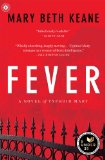Summary | Excerpt | Reading Guide | Reviews | Beyond the Book | Readalikes | Genres & Themes | Author Bio

PROLOGUE
1899
The day began with sour milk and got worse. You were too quick, Mary scolded herself when the milk was returned to the kitchen in its porcelain jug with a message from Mr. Kirkenbauer to take better care. He was tired, Mary knew, from the child crying all night, and moaning, and asking to be rocked. And he was worried. They'd tried to spare him—Mary, Mrs. Kirkenbauer, and the nanny had taken shifts with the boy, but the boy's room was just across the hall from his parents', and the boards of the new house creaked and whined, and the women sometimes forgot to keep their voices lowered, and finally Mr. Kirkenbauer had emerged from the master bedroom in his nightshirt to ask what could be done. "Give him to me," he'd said to Mary at the start of her shift, just as the bleary-eyed nanny hurried back to her small room at the rear of the house.
At two o'clock in the morning none of them cared about being seen in their nightclothes. She'd handed the boy to his father, a baby really, still a baby; they called him a boy because he'd started calling himself a boy, but it wasn't true just yet, in six more months, perhaps, yes, but not yet, not with those fat legs and cheeks, that unsteady, tottering step, the fact that he still loved a lap more than any chair. Mr. Kirkenbauer had observed in a whisper, "He's very warm." He put his pursed lips against the boy's forehead. Then he handed the child back to Mary and sat on the chair in the corner as she rocked the boy and told him all the wonderful things the morning would bring. Did he want to see a sailboat? Mary asked. Did he want to throw rocks in the river? Did he want a warm bun straight from the oven? But the child only stared, and cried, and wrapped his hot arms around Mary's neck, tight, like they were at sea, and she his buoy, and he was terrified of losing his grip.
Mary tried not to make too much of the milk being sent back, of the expression on the butler's face that was meant to mime Mr. Kirkenbauer's, and she reminded herself that Mr. Kirkenbauer was exhausted when he complained about the milk, they all were, and who knew what tone he'd really used when he gave the message to the butler, who had struck Mary from her first day as a nervous type. Mrs. Kirkenbauer was still upstairs, sleeping or trying to, and the nanny was giving the boy a cool bath, his third in as many hours. A light rash had bloomed across his chest, and in the very early hours of the morning Mrs. Kirkenbauer had suggested a plaster of bread and milk, or running to a neighbor for linseed oil, but Mary had said no, she'd seen the rash before, there was nothing for it but rest and trying to get the boy to eat something. The Kirkenbauers weren't the richest family Mary had ever worked for. Their kitchen was not as modern as most where Mary had cooked. But they were kind people, they paid her good wages, and other than a few specific requests from Mrs. Kirkenbauer, Mary had leave to do the shopping and serve whatever she liked.
Sometimes, after supper, Mrs. Kirkenbauer pitched in with the scrubbing, which Mary was baffled to discover she didn't mind. A mistress who hung around the kitchen with her hands in pots and pans and pantry would normally be intolerable, and if Mary had been told this was the way it was going to be she never would have taken the job in the first place, but now that she was there, and had gotten to know them, she was surprised to find that she didn't mind a bit. Mrs. Kirkenbauer had three sisters in Philadelphia and said she missed female company more than anything. Mary continually tried to take the temperature of her mistress's ease, so that perhaps, one day, she'd work up the nerve to ask her a question. Had she always been a person of means, or only when she married Mr. Kirkenbauer? The Kirkenbauers didn't know many people in Dobbs Ferry yet, which meant they seldom entertained, which meant Mary rarely had to cook for more than the three in the family and the staff and herself. The house looked at the Hudson, and on Sundays when the weather was fine they had picnics on the riverbank and always invited any among the servants who had not traveled home to their own families for the day.
Excerpted from Fever by Mary Beth Keane. Copyright © 2013 by Mary Beth Keane. Excerpted by permission of Scribner. All rights reserved. No part of this excerpt may be reproduced or reprinted without permission in writing from the publisher.
Your guide toexceptional books
BookBrowse seeks out and recommends the best in contemporary fiction and nonfiction—books that not only engage and entertain but also deepen our understanding of ourselves and the world around us.